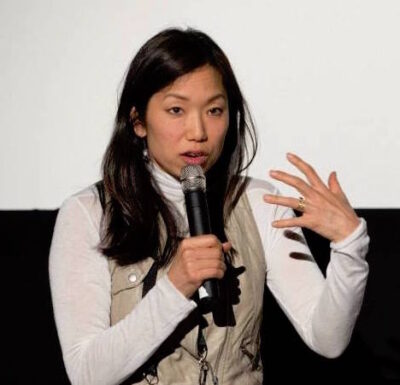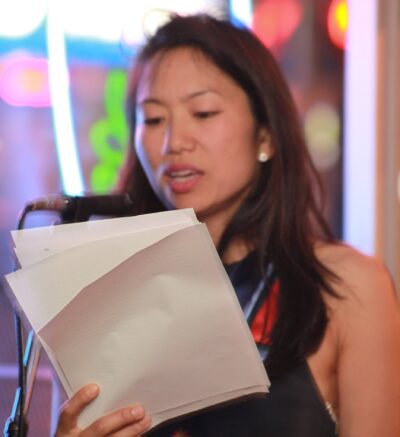1130 A docudrama of defection
The Last Exiles
by Ann Shin
Toronto: HarperCollins (Park Row Books), 2021
$16.99 / 9780778312017
Reviewed by Theo Dombrowski
*
 Stepping into the first few pages of Ann Shin’s The Last Exiles, some readers may feel they’ve entered the recognizable world of dystopian fiction. After all, this is a world “where women in skirt suits all wore the same shade of crimson on their lips and the sidewalks bristled with marching pedestrians, whose stern faces and square haircuts blended into one another.”
Stepping into the first few pages of Ann Shin’s The Last Exiles, some readers may feel they’ve entered the recognizable world of dystopian fiction. After all, this is a world “where women in skirt suits all wore the same shade of crimson on their lips and the sidewalks bristled with marching pedestrians, whose stern faces and square haircuts blended into one another.”
These clone-like throngs marching in step are not the only suggestion of a dystopia.
The bizarre worship of the “Eternal Leader” is echoed by the equally bizarre twists of logic by which every fact is turned into propaganda and every “tragedy is an opportunity for our Dear Leader … to triumph.” Likewise, the grip of terror that prevents people from even mentioning a fellow citizen’s disappearance and the parallel realization that “No one, not even family could be trusted” — all these are familiar tropes.
Equally recognizable to readers of dystopian fiction is the kind of narrative pattern that they may have encountered in George Orwell’s iconic 1984 or, more recently, Margaret Atwood’s A Handmaid’s Tale. Familiar is the way the novel begins with a protagonist — in this case two protagonists — who don’t quite fit into the world of the abject submission. Becoming something like rebels, the parallel protagonists seek a world beyond the entrapping borders of the nightmarishly repressive regime.

There is a difference, though. In many pieces of dystopian literature an organized rebel group seeks to overthrow the regime. In this novel no such group exists. The only hope is escape.
And it’s precisely the desire for escape — and all its fears, frustrations, and entanglements — that is at the core of this novel. After all, as most readers will realize from the get-go, this is not a piece of dystopian fiction. It is fiction, yes, but it is a brutally realistic account of North Korea. Orwell, as the world sadly acknowledges, wasn’t just fantasizing: he was predicting. That his predictions have largely materialized in far too many countries only reinforces the impact of Ann Shin’s novel.
Those who come to the novel through another portal other than that of the dystopian novel will carry with them equally compelling expectations. In an award winning documentary film made in 2012, The Defector: Escape from North Korea, Ann Shin immerses herself (literally) in the world of “brokers” and other agents in China operating with defectors. In this film, she accompanies a handful of North Koreans who have managed to escape North Korea, but who, as almost their only option, undertake a trip of thousands of kilometres, first to the south of China, then via a mountain jungle trek through Laos, to Thailand and the agencies there that might — or might not — help or hinder their further attempts to escape.
Many will have finished this documentary gripped by the story, but also bristling with questions. What was the North Korean experience like that drove these people to such desperate acts? How did they escape into China at all? How did they manage to survive in China until they engaged with the network of illegal agents there? In this novel, apparently carefully researched, Ann Shin answers those questions — and in the way a novel best can.
Deftly employing a range of narrative and fictional strategies, the author gives a richly detailed and complex insight into life in North Korea, but also into the subculture of defection.
Making the most fundamental impact is her handling of her two chief characters. Jin is a country boy from an impoverished family, on scholarship to a city university. Suja is a city girl from a comparatively wealthy family (“comparatively” being the operative word). Sin uses them both as magnifying lenses through which to expose suites of facts worthy of the most detailed documentary.
First, both are intelligent and analytical: they are well suited to channel their perceptions to the reader, even when they are partly crippled by their circumstances.
Second, because both come from such different subcultures — and because Jin goes back to his home village — both allow Shin to limn startling details from their lives. There is a raw sense of authenticity, for example in her description of the ever-present smell of burning plastic in Jin’s village, its struggling people willing to burn anything for a bit of heat. Feeling equally authentic is her description of the shabby chic lives of Suja’s family, where a patched up “mink” stole and a trip to a newly opening store, its shelves virtually empty, evoke bleakly circumscribed lives.

Third, Shin makes each of these characters initially a loyal and credulous worshipper at the altar of the Dear Leader: as Suja declaims at one point, “we’re a small country … yet we have our own nuclear programme. We Chosun [Korean] people will achieve things by any means necessary. We will prevail.”
Fourth, by having them fall in love with each other, Ann Shin pulls the reader into a story driven as much by their love as by the political context. Patterning the love story on something like a Romeo and Juliet narrative line, the author (like Shakespeare!) is able to turn an unflinching eye on the destructive societal forces that keep the young lovers apart — like, for example, Kin Jong Il’s increasingly harsh punishments meted out on defectors, and the web of brokers and gangsters in China in which the young lovers become entangled: “Nothing’s fair. This is the life of a defector,” says one these. “There’s a whole business built around us, and you guys aren’t the first, and won’t be the last North Koreans to get swallowed up in this country.”
As a love story, though, the novel uses the internal changes of the characters as much as the external forces acting on them to prize open the lid on harsh realities. As Jin is torn from Suja, she finds herself shocked to realize that the “Dear Leader’s” portrait, which used to “comfort her,” has come to look “buffoonish.” Later, forced into playing an alien role merely to survive, she feels she has changed internally so much that “It felt right that she would be wearing another woman’s clothes.”
When Jin, also deeply altered, similarly reflects, “You need a little evil in your heart to survive,” he exposes the extent to which internal damage is the tragic result of their violated love. Betrayed by “this leader” to whom he has “devoted his life,” he “felt like a fish … sliced and gutted, his life suddenly emptied of meaning.”
The strategy by which Shin most powerfully illuminates the internal damage wrought by the regime, though, is to focus on the way that the relationship itself is disfigured. Amongst the most powerful passages in the book, both in terms of the handling of language and in terms of the social drama it depicts, is that where Jin, finding out what has happened to Suja thinks, “No, it can’t be” … fumbling, staring uncomprehendingly at Suja’s hand, her beautiful, capable hand.” Likewise Suja finds “unsettling” changes in Jin’s very face. In a particularly affecting passage, Shin has Suja “lightly touch…his cheek as if by touch she could make herself feel more comfortable with this new Jin.”
It isn’t just her handling of these characters on which the foundations of the novel are laid. In the course of their travels (and there are many), they encounter an almost dizzying cast of striking minor characters. Indeed, it is one of Shin’s more remarkable narrative skills that she can, with a few sentences, stir to life one minor character after another, and through a few strokes, provide insight into the social circumstances which create them. Take for example, this razor sharp portrait: “She was a shipwreck of a woman, her body shifting as her left ankle rotated with each step. Her hair was tied back, but gray-black hairs had pulled loose from the elastic, forming a frizzy halo around her head.”
All these characters make much of their impact because of Shin’s ability to infuse her writing with almost painful tension. If we’re not witnessing actual physical flight (as we often are), we are absorbed into a desperate world of planning, scheming, and plotting. From one incident to the next, the author tightens the thumbscrews of anxiety. Thus, for example, as Suja tries to make an illicit contact at a black market, Shin describes her being followed by a potential betrayer. Likewise, as Suja and Jin are about to escape captors, they are spotted and a furtive manoeuvre turns into a panic-stricken flight.
Arguably, though, the book is less a high-tension drama than a “docudrama.” Shin has not just a story to tell, but deeply felt realities to … document.
First, roughly analogous to a documentary’s use of multiple interviewees is Shin’s daring jumps into the minds of bystanding characters for even a few sentences at a time. Perhaps most audacious of these is her jump into the mind of — wait for it — Kim Jon Il himself! The result, needless to say, is extraordinary.

As a documentary, the book provides one revelation or insight after another, each razor sharp detail underpinned by a strong sense of authenticity. Some of the details are closely focused — the way in which nearly starving country people, for example, have to make a kind of porridge out of the inner bark of pine trees. Some are sharp with the eyes of a roving camera — the descriptions of the largely empty shelves of the government department store and of the black market are almost cinematic.
Amongst the most surprising facts, perhaps, is the chasm of privilege between the city dwellers and the villagers. Jin is astounded by the urban students, their “worldliness, their foreign clothes, owning things that Jin never dreamed of having, such as knapsacks with … watches from Poland, jackets from Russia.” Because this is Shin writing, however, she doesn’t stop with the externals: “Jin’s embarrassment ran so deep it wasn’t emotional, it was existential.”
Indeed, one of the cultural features that Shin documents and that stands out particularly strongly for a North American is the crippling power of such shame as she describes here — how it can arise from something most North Americans would see as trivial, and, more, how it can penetrate whole families. Even stealing a small bag of cornmeal from government storage is ruinous. In the words of a bystander, “After the shame he brought to his family, that saekee [sic] runs from prison, saving his own skin, sending his family to damnation.”
The emotional repercussions of non-conformity extend to the physical. Within North Korea, as we learn, even for a minor crime a father can be forced to beat his son in public and denounce him to the crowds. Likewise, a prisoner who attempts escape can be tied to a stake and torn apart by dogs.
It is the physical abuse of women both in North Korea and outside it that Shin seems particularly driven to document. Even the daughter of a comparatively respected family can be preyed on by the state: Suja’s mother pulls her out of gymnastics and dance troupes where she was “liable to be spotted by the Dear Leader’s recruiters. Once a girl was selected, there was no way to say no….” Likewise, Suja recalls the story of her aunt, an attractive girl who, “by the age of fifteen … was selected to perform in the Joy Division entertainment troupe, where she was sequestered for the next decade to dance and entertain the Eternal Leader Kim Il-Sung and the Party; who knows what else she had to do for the Party.”
Even if she escapes to China, a woman has few options. Here she will inevitably fall into the grip of gangs who “had their fingers in everything … exporting and ferrying North Korean women.” In this world of defectors, a woman’s only options are to work in pornographic “web chat,” to perform in a sex trade “karaoke bar,” or to be sold to a family. In China, as we likewise learn, because there are 30 million fewer women than men, bride marketeers prey on every female. As one such racketeer laughs, “Healthy ones only! Don’t bring us the dying girls.”
Sad, disturbing, but with a note of hope for its central characters, the novel leaves readers with a sense of not just finishing a story but having been through a moving — an illuminating — ordeal. Not many novels leave their readers with a sense of privilege. The Last Exiles does.

*

Born on Vancouver Island, Theo Dombrowski grew up in Port Alberni and studied at the University of Victoria and later in Nova Scotia and London, England. With a doctorate in English literature, he returned to teach at Royal Roads, the University of Victoria, and finally at Lester Pearson College at Metchosin. He also studied painting and drawing at the Banff School of Fine Arts and at UVic. Theo has written and illustrated popular guide, travel, and hiking books including Secret Beaches of the Salish Sea (Heritage House, 2012), Seaside Walks of Vancouver Island (Rocky Mountain Books, 2016), Family Walks and Hikes of Vancouver Island — Volume 1: Victoria to Nanaimo, and Volume 2: Nanaimo North to Strathcona Park (RMB, 2018), reviewed by Chris Fink-Jensen, and When Baby Boomers Retire. He has also reviewed books by Lynne Quarmby, Renate Belczyk, Deni Ellis Béchard, Aislinn Hunter, Eva Holland, Anosh Irani, Anne Enright and others for The Ormsby Review. You can learn more about him at his website. Theo Dombrowski lives at Nanoose Bay.
*
The Ormsby Review. More Books. More Reviews. More Often.
Publisher and Editor: Richard Mackie
The Ormsby Review is a journal service for in-depth coverage of B.C. books and authors. The Advisory Board consists of Jean Barman, Wade Davis, Robin Fisher, Cole Harris, Hugh Johnston, Patricia Roy, David Stouck, Maria Tippett, and Graeme Wynn. Scholarly Patron: SFU Graduate Liberal Studies. Honorary Patron: Yosef Wosk. Provincial Government Patron since September 2018: Creative BC
“Only connect.” – E.M. Forster
5 comments on “1130 A docudrama of defection”